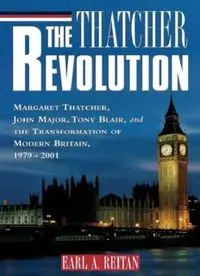
The Thatcher Revolution: Margaret Thatcher, John Major, Tony Blair, and the Transformation of Modern Britain PDF
Preview The Thatcher Revolution: Margaret Thatcher, John Major, Tony Blair, and the Transformation of Modern Britain
ROWMAN & LITTLEFIELD PUBLISHERS, INC. Published in the United States of America by Rowman & Littlefield Publishers, Inc. A Member of the Rowman & Littlefield Publishing Group 4720 Boston Way, Lanham, Maryland 20706 www.rowmanlittlefield.com PO Box 317 Oxford OX2 9RU, UK Copyright © 2003 by Rowman & Littlefield Publishers, Inc. All rights reserved. No part of this publication may be reproduced, stored in a retrieval system, or transmitted in any form or by any means, electronic, mechanical, photocopying, recording, or otherwise, without the prior permission of the publisher. British Library Cataloguing in Publication Information Available Library of Congress Cataloging-in-Publication Data Reitan, E. A. (Earl Aaron), 1925– The Thatcher revolution: Margaret Thatcher, John Major, Tony Blair, and the Transformation of Modern Britain, 1979–2001 / Earl A. Reitan. p.cm. Includes bibliographical references and index. 9781461645825 1. Great Britain—Politics and govemment—1979–1997. 2. Great Britain— Politics and govemment—1997–3. Thatcher, Margaret. 4. Major, John Roy, 1943–5. Blair, Tony, 1953–I. Title. DA589.7 .R45 2002 941.085—dc21 2002008628 Printed in the United States of America ™ The paper used in this publication meets the minimum requirements of American National Standard for Information Sciences—Permanence of Paper for Printed Library Materials, ANSI/NISO Z39.48-1992. Table of Contents Title Page Copyright Page Preface Introduction CHAPTER ONE - The Rise of Margaret Thatcher CHAPTER TWO - The Beginnings of Thatcherism, 1979–1983 CHAPTER THREE - The Heyday of Thatcherism, 1983–1987 CHAPTER FOUR - The Fall of Margaret Thatcher, 1987–1990 CHAPTER FIVE - Thatcherite Reform CHAPTER SIX - John Major and the Thatcher Legacy, 1990–1993 CHAPTER SEVEN - John Major: Continuing the Thatcher Revolution CHAPTER EIGHT - The Triumph of “New Labour,” 1994–1997 CHAPTER NINE - Tony Blair: Getting Going, 1997–1998 CHAPTER TEN - Toward a New Mandate, 1999-2001 CHAPTER ELEVEN - Major and Blair: Wrapping Up the Thatcher Revolution CHAPTER TWELVE - Assessment: What Was the Thatcher Revolution? Bibliographical Note Index About the Author Preface The word “revolution” is a slippery one, but if the word means anything, it means changes of a fundamental nature in a comparatively brief period of time. The word fits the American, French, and Russian Revolutions; maybe the Industrial Revolution, maybe not. The changes that took place in Britain from 1979, when Margaret Thatcher became prime minister, to 2001, when the first ministry of Tony Blair ended, certainly were revolutionary. The Thatcher Revolution broke down institutionalized barriers to development and opened a failing country to the forces of globalization. Britain became a leader, not a laggard, in the emerging world civilization of the late twentieth century. This book is a revision, expansion, and extension of a book published in 1997 entitled Tory Radicalism: Margaret Thatcher, John Major, and the Transformation of Modern Britain, 1979–1997. It is more than a new edition; all chapters of the earlier book have been revised, some of them extensively, and three new chapters have been added. The book presents a fair-minded account of the ideas commonly called “Thatcherism” and the policies adopted by three prime ministers to implement them. It is not scholarly in the conventional sense, although it has been written by a professional historian. It is based on readily available sources. Special attention has been given to the rise of “New Labour,” as led and defined by Neil Kinnock and Tony Blair. Three new chapters cover the first Blair ministry and consider the extent to which the objectives of New Labour were achieved. The book has been written by an American historian for North American readers. For British readers it will provide an American point of view. During my more than four decades as a professor of British history, my family and I have been well treated on our many visits to Britain. We have enjoyed Britain’s splendid public facilities as well as the hospitality of individuals. Special thanks are due for the help and encouragement of British historians, who share with American scholars in the joint enterprise of learning, teaching, and writing about British history. Earl A. Reitan Normal, Illinois Introduction Britain Victorious, 1945 On May 8, 1945, Britain rejoiced at the end of the war in Europe. Britain was a victorious power—an integral part of the alliance, dominated by the United States and the Soviet Union, that had won the greatest and most complete victory of modern times. When he became prime minister in the dark days of 1940, Winston Churchill formed a coalition government that included the leaders of all three political parties: Conservative, Labour, and Liberal. When the war in Europe ended, Churchill wanted to preserve the coalition government to complete the war against Japan, but the Labour members refused. Public opinion overwhelmingly favored an election, which would begin the process of putting Britain back on a peacetime footing. During the war, parliamentary elections had been suspended. The election that took place in June 1945 was the first in ten years. Churchill had led Britain through its darkest hours and to its greatest victory, but the British people did not see him as the man who could fulfill their aspirations for the postwar world. The leader of the Labour Party was Clement Attlee, who had served loyally and well in Churchill’s wartime Cabinet. The Labour Party offered a specific platform: a planned economy, nationalization of major industries, full employment, extensive building of houses, a national health service, and a comprehensive system of social security. Although the Conservative Party manifesto included similar items, Churchill campaigned poorly, railing against the dangers of socialism. The result was a landslide victory for Labour, which gained a strong majority of the seats in the House of Commons. The Labour Revolution The polity that turned to Margaret Thatcher in 1979 was shaped by the British Labour Party in the years following World War II. A new and vastly expanded
